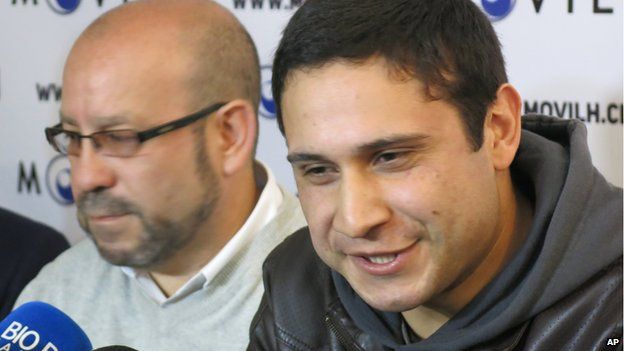Chilean sailor makes history after announcing he is gay
- Published

A sailor in Chile has become the first serving member of the Chilean armed forces to announce he is gay.
Mauricio Ruiz, 24, told a televised news conference his decision had "not been easy", but he wanted to help fight discrimination against homosexuals.
Mr Ruiz said that what was most important was not a soldier's sexual orientation, but his or her willingness to serve the country.
His announcement came with the full backing of the Chilean armed forces.
Like other parts of Latin America, Chile remains a conservative society, especially towards gay marriage.
Chilean President Michelle Bachelet has come out in favour of the idea, but the majority of Chileans oppose it.
'Be yourself'
Mauricio Ruiz said homosexuals had "no reason to hide".
"We can do anything, be marines or in any branch (of the military). We can do whatever profession, and we deserve as much respect as anyone else," he told reporters in the Chilean capital, Santiago.
"In life there's nothing better than to be yourself, to be authentic, to look at people in the eye and for those people to know who you are."
Rolando Jimenez, president of Chile's Movement for Integration and Homosexual Liberation, expressed his gratitude to the Chilean Navy.
"(The Navy is) telling the country and the members of the institution particularly that it is possible for gays and lesbians to be part of the armed forces and that they aren't going to suffer discrimination because of their sexual orientation within these institutions," Mr Jimenez said.
Correspondents say attitudes are changing in Chile, especially after the brutal assault and killing of a young gay man in March 2012, which sparked outrage and triggered a fresh debate over hate crimes.
Four men were jailed in October 2013 for the murder of 25-year-old Daniel Zamudio in Santiago.
And in May 2012 the Chilean Congress approved a new law which made it a crime to discriminate on the basis of race, ethnicity, religion, sexual orientation, gender, appearance or disability.
The gay rights movement has achieved major victories in some other South American nations, like Argentina and Brazil, but homosexuals remain targets of violence and harassment across the continent.
- Published30 April 2014
- Published28 October 2013
- Published10 May 2012